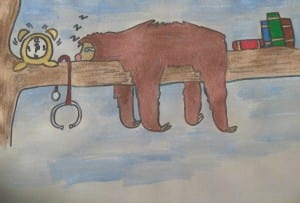Welcome to the jungle

The medical safari has an abundance of different student species, and one of the most enigmatic of these is the student sloth. Generally docile, the species is lesser-spotted in the ecosystem, due to their characteristic dislike of having to leave home unless absolutely necessary. Reasons for this inactivity remain unclear, but experts have cited poor work ethic and fatigue as potential causes.
Student Sloth activities – or lack of
The sloth is not to be confused with the “party animal” classification of student. Though both are often absent from hospital, sloths are disdainful of the party animal’s traditional nocturnal activities – except alcohol consumption, which the sloth will happily partake in provided that they are not required to walk any great distance.
The sloth’s lack of activity during both day and night cycles provokes a compelling mystery as to the cause of their apathetic disposition – potential theories explaining this phenomenon include:
- The secrecy theory : the idea that sloths in fact study through the night, unbeknownst to the world at large.
- The superhero theory : where the sloth is actually a masked crimefighter, who spends his nights battling evil, for the benefit of mankind.
- The screen-scroller theory : where sloths waste hours every night scrolling the internet, playing games and watching movies.
Sadly, the sloth’s innate mysteriousness, plus a lack of evidence to support any of the above theories, means that explorers can only speculate as to the real cause of the sloth’s unending fatigue-state (Note: there is actually substantial evidence in support of the screen-scroller theory. It is without doubt the explanation. Or is it?…)
Benefits of Student Sloth encounters
Explorers who work in close proximity with student sloths will be at both advantage and disadvantage. The sloth’s frequent absence from the ecosystem makes for better one-on-one teaching for explorers and more opportunities to perform skills, but this increased scrutiny can prove dangerous, such as if explorers find themselves one-on-one with a Consultasaurus Rex (I’ll introduce you to this species soon – stay tuned!).
Tasks requiring sloth contribution also become more stressful, as members of the species insist on starting projects when, and only when, the deadline is mere minutes away. Normally a ploy by the sloth to prevent being forced to re-do any work, very rarely will a sloth ever leave tasks incomplete beyond deadline. When working on a task with a sloth, it is better to simply complete your aspect of the project and present this to the sloth, who will then put the work together (also allowing the explorer to avoid the arduous task of reformatting the separate work into one coherent project – it’s the sloth’s problem now!).
Emulate the Student Sloth at your own risk
A final risk to those frequently exposed to sloth activity is “going native”, where individuals become infatuated by the sloth’s easy lifestyle, without considering the sloth’s ability to pass exams effortlessly. Sloths have evolved over years in order to survive a life with countless last-minute projects, minimalist revision and extended hours dedicated to wasteful nothingness. You have not. Whereas they were born to this nature, you have merely adopted it, and as such will not cope when deadlines draw near and pressure mounts. By all means, partake in their lifestyle, but don’t succumb to temptation, for this can be lethal to an explorer’s career in the long-term.
Stay tuned for more Medical School mammals and more!
Uploaded by Eric Richardson on 18th February 2016
